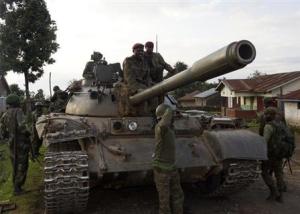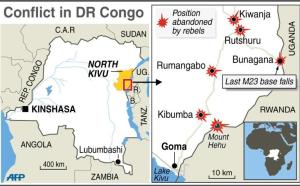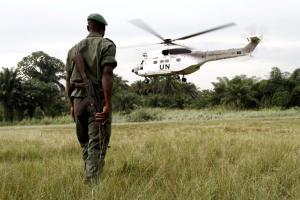DR Congo army captures last stronghold of M23 rebels

Wednesday, October 30th 2013
By Albert Kambale 16 hours ago
Kinshasa (AFP) - DR Congo troops on Wednesday captured the last stronghold of M23 rebels in the troubled east of the country, raising hopes of a return to the negotiating table.
Bunagana, the rebels' main base located in the lush green hills near the border with Uganda, "is completely under our control", government spokesman Lambert Mende told AFP, adding that the final battle for the town had begun early in the morning.
The rebels either fled into the mountains or crossed into neighbouring Uganda after the rout, Mende said.
An official of the UN mission in the country
also confirmed that troops had taken control of the town some 80 kilometres (50
miles) north of Goma, a major mining hub and the capital of North Kivu
province.
Troops and tanks had surrounded the nearby town of Rutshuru on Tuesday in preparation for Wednesday's assault, the army said.
The fall of Bunagana comes a day after Martin Kobler, the head of the peacekeeping mission known as MONUSCO, declared that the push by troops signalled "practically the military end of M23".
In the Ugandan capital Kampala, which is
hosting stop-start peace talks, representatives from both sides voiced guarded
optimism for progress on the negotiating front.
Francois Muamba, representing Kinshasa,
said: "If what we have put on the table is accepted by the M23, with or without
pressure, I think things will move forward."
M23 delegate Roger Lumbala was even more
sanguine, saying negotiators were "putting the final touches to a deal proposed
by Ugandan mediators. I think... tomorrow or the next day we'll have signatures
on this agreement."
Bertrand Bisimwa, M23's political leader who fled by helicopter to Uganda, is due to take part in the Kampala talks.
In Kinshasa however, DR Congo President Joseph Kabila, while saying that "political and diplomatic solutions" were still on the table, warned that if the rebels did not voluntarily disband, he would have "no other choice but to make them do so by force".
The M23 was founded by former Tutsi rebels who were incorporated into the Congolese army under a 2009 peace deal they said was never fully implemented.
They mutinied in April 2012, turning their guns on their former comrades in North Kivu, a province rich in minerals and agricultural produce that armed groups have fought over for more than two decades.
At least 5,000 have fled to Uganda
At the height of their military strength, the M23 rebels were able to capture Goma for 10 days last November, before withdrawing as a precondition for the Kampala peace talks, which began on December 9.
Intermittent fighting has persisted ever since, with a new flareup last Friday after a two-month lull.
A joint offensive by the government and a UN intervention brigade to push back the rebels began in earnest at the weekend.
Government troops quickly took control of a military base at Rumangabo used by the rebels and recaptured another town, Kiwanja, on their way to Rutshuru and finally Bunagana.
At the Rumangabo base, one soldier held in captivity by the M23 for nearly a year with up to 200 others described how the prisoners were "badly treated".
From time to time rebels came and "took people, certainly to kill them because we have never to this day seen them again", said Major James Mwendangabo.
In the nearby market, 26-year-old Jacques Kagura said he was happy to see the rebels leave.
"We suffered with the M23... Some people are still afraid to come back because we know that the M23 likes war whereas we are more reserved."
At least 5,000 people have fled into Uganda to escape the fighting.
That figure could double, warned Lucy Beck, a spokeswoman for the UN refugee agency UNHCR.
"We are predicting up to 10,000 people would have crossed by tomorrow, because the fighting seems to be going on very close to the border... People are continuing to cross even as we speak," she said Wednesday.
Other aid groups estimated that around 22,500 people had left their homes since Friday to move closer to Goma.
Alarmed by the renewed violence, the West called for restraint, with the United States warning that the conflict could submerge the whole region.
The United Nations and numerous rights groups have accused the M23 of atrocities including rape and murder.
Both Kinshasa and the United Nations allege that Uganda and Rwanda have backed the rebels, a claim both countries reject.
- Unrest, Conflicts & War
- Politics & Government
- Kinshasa
=============================
Congo army says hunting rebels deep into mountain bases

Congolese soldiers arrive atop a tank in Bunagana, north of
Goma October 30, 2013. REUTERS/Kenny Kat …
By Kenny Katombe
GOMA, Democratic Republic of Congo (Reuters) - C ongo's army said on Thursday it was hunting rebels deep into forests and mountains along the border with Rwanda and Uganda, the last insurgent hideouts after they were driven from towns they held during a 20-month rebellion.
Ugandan mediators said talks had restarted on Wednesday in Kampala between the government and M23 rebels, but Kinshasa's U.N.-backed army appears on the verge of defeating the most serious uprising to plague the mineral-rich east since the end of the last major war a decade ago.
"We are going to pursue M23 and push them into a corner, wherever they hide, because they are criminals," Congo army spokesman Colonel Olivier Hamuli told Reuters.
"We must not leave them time (to reorganise) because they have martyred the Congolese people for too long. Now is the time to bring peace," Hamuli said.
M23 officials said they withdrew from towns under diplomatic pressure. Bertrand Bissimwa, M23's political leader, told French radio RFI that the military losses would not alter their demands in talks.
Clashes were reported in the hills above Bunagana, the last rebel-controlled town to fall this week, and around Runyoni, a hill that was the birthplace of the rebellion last year.
At their peak last November, M23 occupied the regional capital, Goma, after the army fled and rebels marched past peacekeepers. This defeat led to the U.N. force and mandate being bolstered, an overhaul of Congo's army command and pressure on rebel support, changing the tide of the fighting.
While the deep roots of conflict - ranging from the presence of Rwandan Hutu rebels, ethnic tensions and simmering conflicts over land and minerals - remain, the pace of the advance of Congo's army is unprecedented.
"The M23 may be nearing its end," Jason Stearns, a Congo expert, wrote on his blog, Congo Siasa. "This would be historic - it would be the first time the Congolese government had defeated a major rebellion."
"And it would be the first time since 1996 that an armed group allied to Rwanda is not present in the eastern Congo."
POLITICAL DEAL
U.N. experts and human rights groups have repeatedly accused Rwanda of backing M23, the latest in a series of rebellions in eastern Congo that has been linked to Rwanda's political and military elite.
Rwanda, which has repeatedly sent its army into Congo on the pretext of hunting Hutu rebels who fled there after the 1994 genocide, denies the accusation.
Residents poured into the streets of Bunagana on Wednesday to welcome Congo's army, which is better known for its chaotic command and poor discipline than lightening advance.
"We have spent a year with M23, we could never imagine that one day we would be liberated by the army," said a resident in Bunagana, the border town that provided rebels with funding from cross-border taxation and unfettered access to neighbours.
"We have lived in terror (with M23), we were traumatised."
Diplomats say a political deal is needed alongside the military gains to ensure progress is not reversed by rebels returning, as they have in the past, due to frustrations over the Kinshasa government's poor handling of its remote regions.
Lieutenant Colonel Paddy Ankunda, spokesman for Uganda's army and the mediation team, said progress was being made at talks between the two sides though questions remained over which rebels would be granted an amnesty.
"Technical committees are reviewing all the remaining areas and we hope the final agreement will be signed soon," he said.
Fatou Bensouda, prosecutor of the International Criminal Court, on Wednesday warned that she might broaden investigations into crimes in Congo and called for all those responsible to be prosecuted.
U.N. peacekeepers have confirmed they are investigating reports of mass graves in areas vacated by rebels.
GOMA, Democratic Republic of Congo (Reuters) - C ongo's army said on Thursday it was hunting rebels deep into forests and mountains along the border with Rwanda and Uganda, the last insurgent hideouts after they were driven from towns they held during a 20-month rebellion.
Ugandan mediators said talks had restarted on Wednesday in Kampala between the government and M23 rebels, but Kinshasa's U.N.-backed army appears on the verge of defeating the most serious uprising to plague the mineral-rich east since the end of the last major war a decade ago.
"We are going to pursue M23 and push them into a corner, wherever they hide, because they are criminals," Congo army spokesman Colonel Olivier Hamuli told Reuters.
"We must not leave them time (to reorganise) because they have martyred the Congolese people for too long. Now is the time to bring peace," Hamuli said.
M23 officials said they withdrew from towns under diplomatic pressure. Bertrand Bissimwa, M23's political leader, told French radio RFI that the military losses would not alter their demands in talks.
Clashes were reported in the hills above Bunagana, the last rebel-controlled town to fall this week, and around Runyoni, a hill that was the birthplace of the rebellion last year.
At their peak last November, M23 occupied the regional capital, Goma, after the army fled and rebels marched past peacekeepers. This defeat led to the U.N. force and mandate being bolstered, an overhaul of Congo's army command and pressure on rebel support, changing the tide of the fighting.
While the deep roots of conflict - ranging from the presence of Rwandan Hutu rebels, ethnic tensions and simmering conflicts over land and minerals - remain, the pace of the advance of Congo's army is unprecedented.
"The M23 may be nearing its end," Jason Stearns, a Congo expert, wrote on his blog, Congo Siasa. "This would be historic - it would be the first time the Congolese government had defeated a major rebellion."
"And it would be the first time since 1996 that an armed group allied to Rwanda is not present in the eastern Congo."
POLITICAL DEAL
U.N. experts and human rights groups have repeatedly accused Rwanda of backing M23, the latest in a series of rebellions in eastern Congo that has been linked to Rwanda's political and military elite.
Rwanda, which has repeatedly sent its army into Congo on the pretext of hunting Hutu rebels who fled there after the 1994 genocide, denies the accusation.
Residents poured into the streets of Bunagana on Wednesday to welcome Congo's army, which is better known for its chaotic command and poor discipline than lightening advance.
"We have spent a year with M23, we could never imagine that one day we would be liberated by the army," said a resident in Bunagana, the border town that provided rebels with funding from cross-border taxation and unfettered access to neighbours.
"We have lived in terror (with M23), we were traumatised."
Diplomats say a political deal is needed alongside the military gains to ensure progress is not reversed by rebels returning, as they have in the past, due to frustrations over the Kinshasa government's poor handling of its remote regions.
Lieutenant Colonel Paddy Ankunda, spokesman for Uganda's army and the mediation team, said progress was being made at talks between the two sides though questions remained over which rebels would be granted an amnesty.
"Technical committees are reviewing all the remaining areas and we hope the final agreement will be signed soon," he said.
Fatou Bensouda, prosecutor of the International Criminal Court, on Wednesday warned that she might broaden investigations into crimes in Congo and called for all those responsible to be prosecuted.
U.N. peacekeepers have confirmed they are investigating reports of mass graves in areas vacated by rebels.



No comments:
Post a Comment